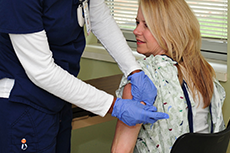Diabetes Care Checklist

Preventative Care
Vaccines are very important for people with type 1 or type 2 diabetes. People with diabetes are more likely to get the flu and other infections than people without diabetes. Diabetes can make the immune system less able to fight infection while the infection makes blood sugar control more difficult.
When people with diabetes get sick, they are at risk for pneumonia, bronchitis, sinus infections and ear infections. The good news is the immune system of a diabetic person responds to vaccinations as well a non-diabetic person’s.
People with diabetes should take everyday precautions including avoiding sick contacts. Those with flu-like symptoms should stay home for 24 hours after the fever is gone (without the use of fever-reducing drugs). Covering nose and mouth when sneezing and coughing with a tissue, not touching eyes, nose and mouth, washing hands often, cleaning surfaces like keyboards and phones between users are all recommended as everyday preventative actions.
Diabetics should have a sick day plan and supplies to implement the plan on hand.
CDC Vaccine Recommendations for Diabetics:

- Flu vaccine every year (precaution against giving nasal flu vaccine to diabetics.)
- Tdap (tetanus, diphtheria and pertussis) vaccine to protect against tetanus, diphtheria and whooping cough
- Pneumococcal polysaccharide vaccine to protect against pneumonia and other similar diseases
- Hepatitis B vaccine series to protect against hepatitis B
- Zoster vaccine to protect against shingles if you are 60 years and older
- HPV vaccine to protect against human papillomavirus if you are a man or woman under age 26
- MMR vaccine to protect against measles, mumps, and rubella if you were born in 1957 or after and have not gotten this vaccine or do not have immunity to these diseases. Your doctor may do a blood test to see if you have immunity.
- Varicella vaccine to protect against chickenpox if you were born in 1980 or after and have not gotten two doses of this vaccine or do not have immunity to this disease. Your doctor may do a blood test to see if you have immunity.
Diabetes Care Checklist: Know Your Numbers
Diabetes affects many aspects of your health. Uncontrolled high blood sugar over the long term can lead to health problems for people with type 1 and type 2 diabetes. These problems include:
- Damage to nerves (neuropathy) which can cause numbness or discomfort in your hands or feet or may affect organs like your stomach
- Damage to blood vessels in the eyes (retinopathy) may lead to blindness
- Damage to blood vessels kidneys which may lead to kidney failure
- Blockages in blood vessels which can cause heart disease or stroke
- Blockages in the blood vessels to the legs which can lead to slow healing sores on the legs and feet and even to amputation.
In addition to controlling your blood sugar, regular follow-up with your doctor is important in maintaining overall wellness. Regular monitoring of items like your A1C and cholesterol will help keep you on track.